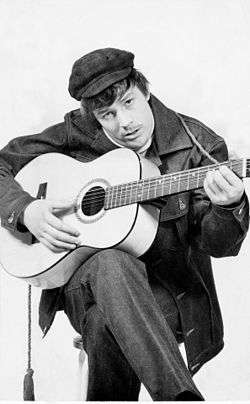Irwin Goodman
Antti Yrjö Hammarberg (14 September 1943 – 14 January 1991), professionally known as Irwin Goodman, was a popular Finnish rock and folk singer. In the late 1960s he was widely known as a protest singer. He recorded over 300 songs, most of which were his own compositions, with lyrics written by Vexi Salmi. Irwin Goodman started as a protest song singer in the folk boom of the mid-1960s; his humorous songs, often mocking the authorities, became favorites of the Finnish people, to the extent that small Irwin singalike contests are still held by some pubs for entertainment. Goodman had continuing troubles with Finnish tax authorities and had ever-worsening problems with alcohol. His escapades were eagerly followed by sensationalist magazines such as Hymy.
Irwin Goodman | |
|---|---|
 Irwin Goodman in 1966. | |
| Background information | |
| Birth name | Antti Yrjö Hammarberg |
| Also known as | Irwin Goodman Rock-Williams William White Andy Rudolf Holtz Hamppari Bob Mersey Bill Black |
| Born | 14 September 1943 Hämeenlinna, 1943 |
| Origin | Hämeenlinna, Finland |
| Died | 14 January 1991 (aged 47) Hamina, Finland |
| Genres | Rock Folk Blues |
| Occupation(s) | Singer-songwriter |
| Instruments | Vocals guitar harmonica |
| Years active | 1962–1991 |
| Labels | Finnlevy |
| Website | www.irwingoodman.com |
Goodman died of a heart attack while on the way from Vyborg to Hamina, Finland. The story of his life was turned into a feature film, Rentun Ruusu, in 2001.
Irwin's most famous songs include "Poing Poing Poing" (1971), "Haistakaa paska koko valtiovalta" (1976), "Rentun ruusu" (1988), "Ei tippa tapa" (1966), "Työmiehen lauantai" (1965), "En kerro kuinka jouduin naimisiin" (1965) and "Tyttö tuli" (1978). He won the Syksyn Sävel song contest twice.
Common themes in his songs were poverty, taxes, drinking and alcoholism ("Ei tippa tapa", "Vielä yhdet", "Kieltolaki", "Homma käy", "Työmiehen lauantai", "Rentun ruusu") and problems with money ("Raha ratkaisee", "Kun ei rahat riitä", "Meni rahahommat pieleen", "Manu vippaa muutama markka"). He protested the government with songs like "Juhlavalssi," and "Haistakaa paska koko valtiovalta".
In 1971, Irwin released an album featuring the actor Esa Pakarinen. His 1972 album Kohta taas on joulu consists of Christmas carols. The later songs ("Suruton nuoruusaika", "Maailma on kaunis", "Ai, ai, ai, kun nuori ois" and "Viimeinen laulu") were often darker in theme than the songs of the 1960s and 1970s.
Albums discography
- Irwinismi (1966)
- Ei tippa tapa (1966)
- Osta minut (1967)
- Reteesti vaan (1968)
- Irwin Goodman (1969)
- Työmiehen lauantai (1970)
- St. Pauli ja Reeperbahn (1970)
- Lonkalta (1971, feat. Esa Pakarinen)
- Poing, poing, poing (1971)
- Kohta taas on joulu (1972)
- Las Palmas (1972)
- Si Si Si (1973)
- Häirikkö (1976)
- Kolmastoista kerta (1977)
- Cha Cha Cha (1977)
- Inkkareita ja länkkäreitä (1977)
- Tyttö tuli (1978)
- Kulkurin kulta (1979, feat. Hanne)
- Keisari Irwin I (1979)
- Härmäläinen perusjuntti (1984)
- Dirly dirly dee (1985)
- Rentun Ruusu (1988)
- Vuosikerta −89 (1989)
- Hurraa – Me teemme laivoja (1990)
- Ai ai ai kun nuori ois (1990)
External links
- Irwin Goodman discography at Discogs